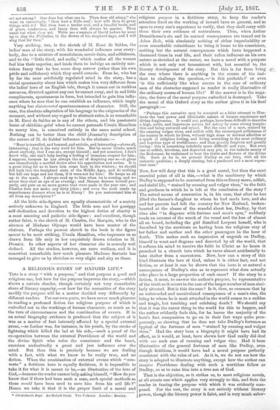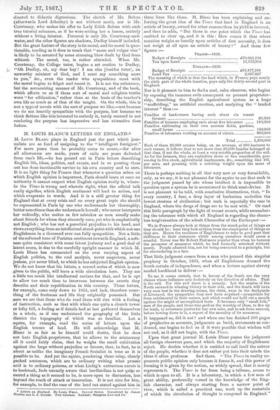A RELIGIOUS STORY OF OXFORD LIFE.*
Tins is a story " with a purpose," and that purpose a good and religious one, but how far the purpose improves the story,—which shows a certain slender, though certainly not very remarkable .share of literary capacity,—or how far the necessities of the story modify the purpose will be a matter decided very differently by -different readers. For our own parts, we have never much pleasure in reading a professed fiction the religious purpose of which is embodied not in the workings of human character, so much as in the tarn of circumstances and the combination of events. If in -an actual biography evidence is produced that the subject of it was as a matter of fact intensely affected by a special external -event, —as Luther was, for instance, in his youth, by the stroke of lightning which killed the lad at his side,—such a proof of the -co-operation between the external Providence of the world and the divine Spirit who rules the conscience and the heart, exercises undoubtedly a great and just influence over the mind. But then this is precisely because we are dealing with a fact, with what we know to be really true, and no fiction. When the combination of external events which " con- verts " a fictitious hero is equally fictitious, it is impossible to take it for what it is meant to be,--an illustration of the love of God, —because the reader cannot help asking himself, "How do you know that if there had been such a man, such special methods as these would have been used to save him from his evil life ?" Hence we take it that it is the proper limit of a moral and * Christchurch Days. An Oiloyd Story. Two Volumes. London: Bentley. religious purpose in a fictitious story, to keep the reader's attention fixed on the working of inward laws so general, and so
open to every one's experience to verify, that they shall carry with them their own evidence of naturalness. Thus, when Arthur Donnithorne's sin and its natural consequences are traced out in
Adam Bede, with absolutely nothing of either improbability or even remarkable coincidence to bring it home to his conscience,
nothing but the natural consequences which have happened a thousand times in real life, and their reflex influence on his own
nature as sketched at the outset, we have a novel with a purpose which is not only not inconsistent with, but essential to, the literary development of the story. But this is far from being the case where there is anything in the course of the inci- dent to challenge the question,—' is this probable ?' or even 'is this sufficiently like what occurs in the case of ordinary
men of the character supposed to render it really illustrative of
the ordinary course of human life?' If the answer is in the nega- tive, the force of the moral purpose embodied is destroyed. Take the moral of this Oxford story as the author gives it in his final
paragraph :—
" Perhaps this narrative may be accepted as a faint attempt to illus- trate the vast power and illimitable nature of human repentance and divine forgiveness. It would not, perhaps, have been difficult to describe a high, noble, and impetuous nature led astray by some strong tempta- tion and being restored and raised. But the case of a man, stained by the cunning vulgar vices, and selfish with the stereotyped selfishness of the society in which he lives, without high aims or natural affection or a spark of religious feeling, and living according to the most ordinary and hopeless type of worldliness ; and then greatly forgiven and greatly loving: this is something infinitely more difficult and rare. But even one so selfish, frivolous, and depraved may yet, in the infinite mercy of the Redeemer, be reclaimed to bear the fruits and flowers of the divine life. Such as he is, we present Dudley as our hero, with all his unheroic qualities ; a deeply sinning, but a pardoned and a most repen- tant man."
Now, few will deny that this is a good moral, but then the most
essential point of all is this,—what is the machinery by which Dudley is supposed to be converted from this ordinary mean, selfish, and sinful life, " stained by cunning and vulgar vices," to the faith and goodness in which he is left at the conclusion of the story ? The actual means of conversion is, in his case, that after he has jilted the farmer's daughter to whom he had made love, and she and her parents had left the country for New Zealand, broken- hearted at the shame of the scandal about her, Dudley, by that time also " in disgrace with fortune and men's eyes," suddenly reads an account of the wreck of the vessel and the loss of almost all on board, including the girl Rosalind Larpent herself, who is described by the survivors as having been the religious stay of her father and mother and the other passengers in -the hour of death. This makes such an impression of anguish on Dudley, himself in want and disgrace and deserted by all the world, that it softens his mind to receive the faith in Christ as he hears it preached in a church into which he turns almost accidentally to take shelter from a snowstorm. Now, how can a story of this kind illustrate the love of God, unless it is either fact, and not fiction, or at least it can be shown that the issue is so natural a consequence of Dudley's sins as to represent what does actually take place in a large proportion of such cases? If the story be a fiction, it must, to answer the author's purpose, be representative of the truth as it occurs in the case of the larger number of men simi- larly situated. But is this the case? Is it, then, so common that by an unintended and uncalculated consequence of a man's sins, the being to whom he is most attached in the world comes to a sudden and tragic, but touching and subduing death ? We should say that it was the rarest thing in the world for this to happen, and the author evidently feels this, for he leaves the majority of the hero's fast companions to go on in their fast ways quite pros- perously, so showing that he does not take Dudley's fortunes as typical of the fortunes of men " stained by cunning and vulgar
vices.' Had the story been a biography it might have had its effect, as it would, at least, have shown how God really did deal with one such case of cunning and vulgar vice. Had it been illustrative of the general fortunes of men like Dudley, even though fictitious, it would have had a moral purpose perfectly consistent with the rules of art. As it is, we do not see how the story is adapted to illustrate anything, except how the author can imagine Providence dealing with such a worthless fellow as Dudley, so as to raise him into a true son of God.
That is. the objection, as it strikes us, to most religious novels, at all events one which applies very strongly to this, and frets the reader in tracing the purpose with which it was evidently com- posed. For the rest, the story is not entirely without literary power, though the literary power is faint, and is very much subor-
dinated to didactic digressions. The sketch of Mr. Bohuu (afterwards Lord Atherley) is not without merit, nor is Mr. Courtenay, who makes his offer to Lady Edith Bohun with such true tutorial calmness, as if he were setting her a lesson, entirely without a living interest. Perceval is only Mr. Courtenay-and- water, and the other figures are shadows, Dudley himself included. But the great feature of the story is its moral, and its moral is ques- tionable, tending as it does to teach that "mean and vulgar vice is likely to be arrested by some stunning blow dealt by God from without. The moral, too, is rather obtruded. When Mr. Courtenay, the College tutor, begins a set oration to Dudley,
L "Oh Dudley, oh, my dear boy I I am also [besides tutor], an unworthy minister of God, and I must say something more to you," &c., even the reader who sympathizes most with the moral begins to fidget and resent it. It is not the substance, but the sermonizing manner of Mr. Courtenay, and of the book, which affects us as if these sort of moral and religious truths were "for edification," rather than at the basis of the teacher's own life as much as of that of the taught. On the whole, this is not a type of novels with the sort of purpose we like,—not because we do not heartily sympathize with the purpose, but because we think fictions like this invented to embody it, rarely succeed in not rendering the purpose less impressive and less attractive than before.































 Previous page
Previous page